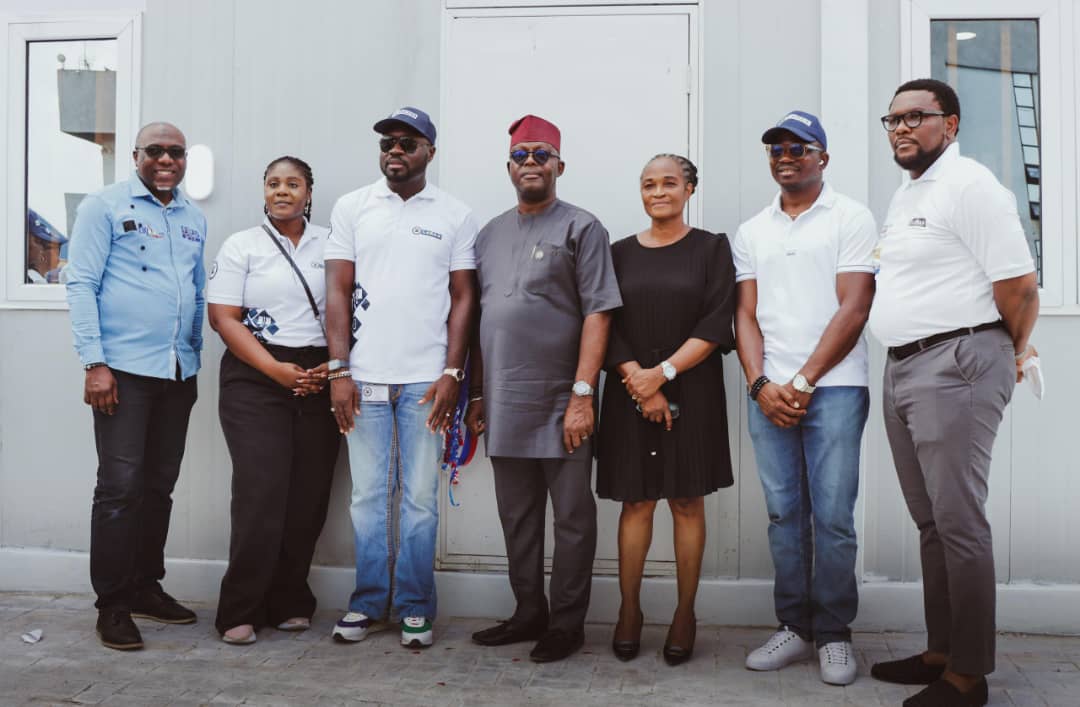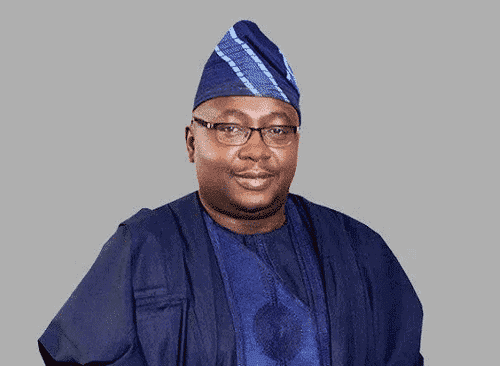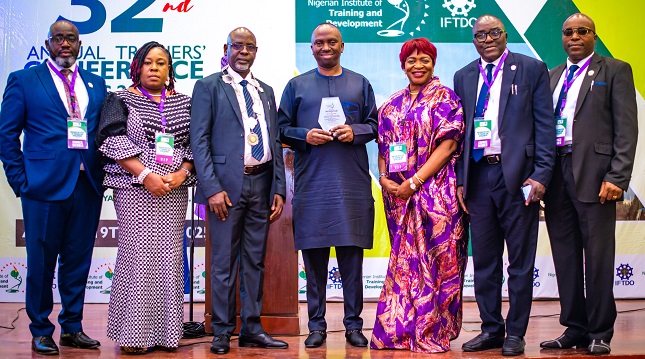News
LASAA Enhances Operations with New Porta Cabin Offices in Lagos

Lagos State Signage and Advertisement Agency (LASAA) has launched new porta cabin offices located in Badagry Local Government Secretariat, Ikorodu Local Government Secretariat, Lagos Television premises and LASAA warehouse.

L-R: The General Manager, Radio Lagos, Mr Olajide Lawal; Head of Project Coordination and Local Government Affairs, Lagos State Signage and Advertisement Agency (LASAA), Mrs. Abimbola Odunmbaku; Managing Director/CEO, LASAA, Prince Fatiu Akiolu; Permanent Secretary, Lagos State Ministry of Information and Strategy, Mr Olumide Sogunle; Director of Administration and Human Resource, Lagos Television, Mrs. Oluwatoyin Ayanbadejo; Senior Special Assistant to the Governor of Lagos State on LASAA, Hon. Kunle Dabiri; and Deputy General Manager, Operations and Innovations, Mr Gbolahan Dixon during the Agency’s commissioning of new offices (porta cabins) for operational expansion in Lagos recently.
This initiative aims to bring the Agency closer to its many clients and improve the regulation of outdoor advertising landscape, ultimately optimizing revenue generation for the State.
Speaking at the launching of the new offices, the Managing Director/CEO of the Agency, Prince Fatiu Akiolu said they are extensions of the Agency’s branches across the State.
According to him, “The porta cabins launched are not just physical structures, they represent our ongoing commitment to enhancing the efficiency and effectiveness of our operations.”
The MD explained that, with the rapid growth of our city and the increase in the formation of businesses, Lagos has become a dynamic hub for innovation and creativity, and with that comes the need for sophisticated solutions to manage our operations better to meet the rise in the display of business signs in the State.
In his words, “Strategically situating the offices is important to the Lagos State Government for revenue optimization as it will impact positively on the development of the State, as we demonstrate our support for Mr Governor, Mr Babajide Sanwoolu towards actualizing a much greater Lagos.”
He further explained that, “It has become necessary for the Agency to provide these decent portal cabins for the convenience of our staff members and by extension, for our revered walk-in clients who visit to register their business signs and make relevant enquiries.”
He averred that, “These portal cabins symbolize a major step forward in our operations at LASAA. The provisions reflect our dedication to embracing innovation and modernization to improve our service delivery. With these new facilities, we are not just upgrading our operational capabilities; we are also ensuring that our processes are more efficient, accessible, and transparent. Each facility is fitted with air-conditioners, computers, tables, chairs, bathrooms, and kitchens,” Prince Fatiu stated.
Also speaking, the Deputy General Manager, Operations and Innovations of LASAA, Mr Adegbolahan Dixon made it known that it has become imperative to open new porta cabin offices to complement the existing ones as some local governments in the State do not have spaces where they can construct new office buildings.
According to him, “We decided to approach some sister agencies with spaces within their premises to set up the porta cabin offices to reach more clients.”
He said that, “The overriding idea is to be close to our existing and potential customers instead of them going to our head office to transact business. With these offices that are close to them, they can interface with our members of staff who will guide them on how to register and obtain permits for their business signs.”
Dixon also revealed that the Agency has opened a good number of the offices this year which are effectively serving a purpose and that more will be opened for operational expansion next year.
The Lagos State Signage and Advertisement Agency (LASAA) was established by the Lagos State Structures for Signage and Advertisement Agency Law, 2006 and the Amendment, thereto is responsible for regulating and controlling outdoor advertising and signage displays in Lagos State.
In its commitment to excellence, the Agency plays a crucial role in shaping the visual landscape of Lagos through effective regulation and innovative solutions.
News
AfDB, Aerosense Ink Agreement to Propel Drone Adoption in Africa

The African Development Bank (AfDB) and Aerosense Inc, a Japanese drone manufacturer, have inked an agreement to expand cooperation and initiatives in drone technology in Africa.

According to the AfDB, representatives from both organisations signed a Letter of Intent late last week on the sidelines of the ninth Tokyo International Conference on African Development in Yokohama, Japan.
The agreement was signed by Solomon Quaynor, AfDB’s vice president for private sector, infrastructure, and industrialisation, and Kohtaro Sabe, Aerosense’s president and CEO.
In June, the AfDB Sustainable Road Maintenance Program for Africa issued a request for proposals, and the company was chosen.
The agreement formalises a relationship of mutual cooperation, assistance, information and knowledge sharing between the two institutions, as well as the exploration of co-financing and deal opportunities and appropriate coordination of actions between them and their respective teams, with a focus on the promotion of sustainable infrastructure solutions in Africa, according to the bank.
In addition, the AfDB will assist collaboration with the public sector, lead awareness-raising initiatives, support capacity building for local partners, and investigate potential debt (and/or equity) financing support for drone deployment projects.
Aerosense will conduct demand studies for drone solutions in specific African markets, as well as technical feasibility studies for drone application, taking into account local geographical factors, and investigate potential deployment options based on positive feasibility study results.
“The program is a bold response to Africa’s growing infrastructure challenges. By partnering with Aerosense, we will not only promote efficient road management but also consider promoting other unique solutions such as disaster management, river/flooding control, agricultural sensing, and medical equipment delivery,” said Quaynor.
For Sabe, the project is about leveraging multinational technological solutions to address African challenges.
He said: “It is a great honour to serve the people in Africa with our Japanese technology for enhancing their quality of life. We are looking forward to collaborating with AfDB to build a better future together in a concrete manner.”
News
Nigeria Taps $190M JICA Loan to Power Underserved Communities

Nigeria is seeking a $190 million renewable energy loan backed by the Japan International Cooperation Agency (JICA), according to Adebayo Adelabu, minister of power.

Minister Adebayo-Adelabu
In a statement released by the ministry on Saturday, Adelabu disclosed the plan during the 9th Tokyo International Conference on African Development (TICAD 9) in Yokohama, Japan, where the Nigerian delegation led by President Bola Tinubu held high-level discussions on power, infrastructure, and industrial transformation.
Adelabu said the facility is aimed at scaling distributed renewable energy solutions across underserved communities. “This builds on the recently launched $750 million World Bank Distributed Access through Renewable Energy Scale-up (DARES) programme under the Mission 300 Compact, which aims to bring clean and reliable electricity to more than 17 million Nigerians,” the ministry said.
The minister also held talks with Japanese corporations including Toshiba, Hitachi, Japan’s transmission and distribution corporation, and energy exchange corporations. Discussions focused on strengthening transmission infrastructure, improving operational efficiency, and cutting system losses.
The ministry said these engagements build on recent Federal Executive Council approvals for counterpart funding of N19.08 billion to unlock a $238 million loan from JICA. The loan will finance the expansion of the national grid, including the construction of over 200km of new 330kV and 132kV double circuit lines, six new substations, and extensions to existing facilities.
Three substations funded through a $32 million JICA grant—located in Apo (FCT), Keffi (Nasarawa), and Apapa (Lagos)—are also set for commissioning, a move expected to boost supply reliability for households, industries, and business hubs, including the Lagos Port.
Speaking during a panel session themed “HICKARE Africa: Harnessing Innovation, Co-creation, and Knowledge for Accessible and Resilient Energy for Africa”, Adelabu highlighted Nigeria’s energy gap, noting that only 55–60 percent of the population currently has access to electricity, much of which is unreliable.
He outlined the government’s approach to expand grid access in urban areas while accelerating off-grid solutions such as solar mini-grids and standalone systems in rural and peri-urban communities. He pointed to challenges including limited access to affordable capital, high costs for rural households, and the under-utilisation of productive-use equipment.
Despite these hurdles, the minister reaffirmed the government’s commitment to reforms through supportive policies, private-sector collaboration, and increased local manufacturing of renewable energy components.
Adelabu commended JICA and the Japanese government for their “long-standing support” to Nigeria’s power sector, praising their contributions to infrastructure, training, technical studies, and financing. He expressed optimism for deeper partnerships between both countries in driving Nigeria’s energy transition.
News
Banigbe, T2 CEO says Nigeria’s Growth Hinges on Learning, Innovation, and Afrocentric Content

Obafemi Banigbe, chief executive officer of T2, has stressed that Nigeria’s long-term economic transformation depends on continuous upskilling, digital learning, and workforce adaptability.

Speaking as Special Guest at the 32nd Annual Trainers’ Conference (ATC 2025) of the Nigerian Institute of Training and Development (NITAD), held recently at the Shehu Musa Yar’Adua Centre, Abuja, Banigbe warned that without deliberate investment in human capital and technology-driven innovation, the nation risks lagging behind in a rapidly evolving global economy.
Drawing from personal reflections, practical insights, and a forward-looking vision, Banigbe urged Nigerians to reimagine approaches to learning, work, and growth in order to build a prosperous, inclusive, and innovation-led society.
He emphasized that the traditional model of “learning once and working forever” is obsolete.
“With Nigeria projected to become the world’s third most populous nation by 2050, and 70 percent of its citizens under 30, the need for continuous upskilling, digital learning, and adaptability is not optional, it is existential,” he stated.
Banigbe underscored the importance of democratizing access to digital tools, ensuring that every Nigerian child has the same opportunities as peers in developed economies.
He called for the creation of Afrocentric educational content, including culturally relevant cartoons, to help children learn science, mathematics, and history through familiar cultural references rather than foreign identities that disconnect them from their environment.
He also urged a national shift away from a culture that prizes certificates and training hours to one that rewards competence, innovation, and problem-solving.
He envisioned a civil service and workforce driven by solutions rather than processes, stressing that while artificial intelligence may analyze and automate, it cannot dream, uphold ethics, or create new nations, a reminder of the enduring human advantage.
Banigbe further encouraged adoption of cost-effective training models such as online platforms, virtual cohorts, and open-source learning, while acknowledging the continued value of global exposure where local resources fall short.
During an interactive question and answer session, he addressed concerns around affordability, accessibility, and the role of self-driven digital education in shaping Nigeria’s future-ready workforce.
He assured participants that T2 itself is on a path of transformation, committed to delivering world-class services as a proudly Nigerian brand.
In recognition of his contribution to national dialogue and thought leadership, the President of NITAD, James Bulus, presented Banigbe with an Award of Excellence.

 E-Financial3 days ago
E-Financial3 days agoFBNQuest Merchant Bank Facilitates Landmark ₦5Bn Commercial Paper Programme for Accion Microfinance Bank

 E-Business3 days ago
E-Business3 days agoNDPC Begins Probe of Banks, Others for Data Breaches

 Telecom3 days ago
Telecom3 days agoDigital Realty Commits to Africa’s Digital Transformation @ Launch of LKK2 Data Center

 E-Financial3 days ago
E-Financial3 days agoUBA to Deepen Financial Inclusion, Boost Savings’ Culture with Super Savers’ Promo

 Telecom3 days ago
Telecom3 days agoIntel–U.S. Partnership Reshapes Semiconductor Landscape with Historic Equity Agreement

 E-Financial3 days ago
E-Financial3 days agoFidelity Bank Resumes Intl Transactions on Naira Debit Cards

 E-Financial3 days ago
E-Financial3 days agoNigeria Leads Africa in Stablecoin Adoption with $22Bn in Transactions

 Telecom3 days ago
Telecom3 days agoNITDA Alerts Nigerians to eSIM Security Flaw Deployed to Hijack Devices Worldwide























